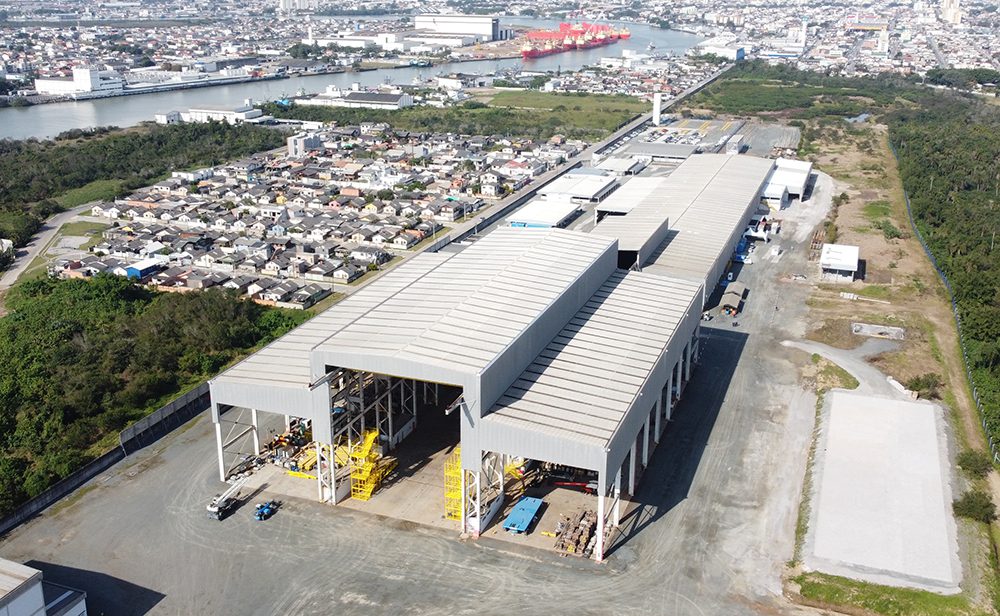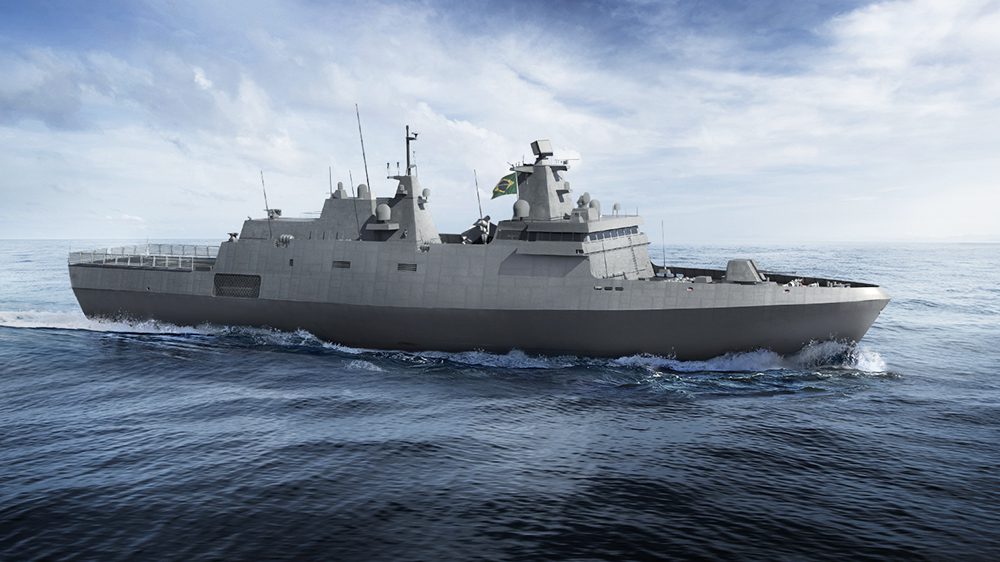The Brazilian Navy’s new ships are being built without the use of printed drawings on paper
Águas Azuis, a Special Purpose Company (SPE) established between thyssenkrupp Marine Systems, Embraer Defesa & Segurança and Atech, is responsible for the construction of the Tamandaré Class frigates for the Brazilian Navy
(DefesaNet) The thyssenkrupp Estaleiro Brasil Sul is the stage for the most innovative naval project ever developed in the country: the construction of the Tamandaré Class frigates for the Brazilian Navy. There will be four defense vessels, equipped with the most advanced technologies available.
What almost nobody knows is that the innovation of the project is not limited to the technologies and systems that will be present in the vessels. The way it is conceived is unprecedented in the South American naval industry. Historically, projects of this size are developed from a large amount of printed documents: drawings, procedures, and manuals that require many copies and recurrent updates.
A scenario that transcends the benefit to the environment. The digitalization of a production line focuses on the security of the information contained in the documents due to the confidentiality required in a military project. Facing this challenge, the shipyard, with the support of thyssenkrupp Marine Systems’ headquarters in Germany, implemented a methodology for engineering projects baptized “Paperless”, which consists in eliminating the use of paper drawings in the frigate production line, digitalizing and preparing the shipyard to be a reference in technological implementation.
For everything to work, more than 20 totems with computers were installed in the shipyard’s production area – by the end of the year there will be 40 – and about 25 tablets. In this equipment, the workers involved in the project can access the systems, drawings in 2D and 3D format, check-lists, procedures, and manuals, all always updated in real time by the engineering team in Brazil and Germany. Through this digital transformation, daily processes such as the scheduling of labor, internal request for consumables, traceability of plates, profiles, pipes and quality verification are optimized.
The next step is even more innovative: the use of augmented reality. Through glasses with this technology, it will be possible to superimpose holograms on the physical part, checking assembly positioning, interference between sectors, compartment layout, and quality verification. This can be done by professionals on site or even by thyssenkrupp specialists in Germany.
“The delivery of a technological product begins in production. These investments in innovation will guarantee the delivery of the frigates with the highest standards of quality and excellence, within the deadlines established together with EMGEPRON and the Brazilian Navy,” explains Fernando Queiroz, CEO of Águas Azuis. The shipyard’s production leader, João Aldo Filho Hofmann, pointed out that the mock-up of the first ship, presented in June of this year, has already been built 100% paperless, that is, without printing drawings on paper.
The project is led by naval engineer Letícia Bodanese, who has worked for two years at thyssenkrupp Estaleiro Brasil Sul. She says that the main challenge in innovative projects such as paperless is cultural. “People naturally tend to resist the change process. But after a stage of awareness, they learn to work in the new scenario and contribute to the process, incorporating the changes in their habits, contributing to the personal development of each employee and the development of the company,” explains the engineer. For her, the fact that the concept was introduced from the beginning of the Tamandaré Class Frigates construction project was also a success factor for the initiative.
Acquired by thyssenkrupp in 2020, the Brasil Sul Shipyard is one of the most modern in Brazil. Located in a region with a strong naval vocation, in an area of 310,000 m², it has a large construction capacity and applies the most innovative production processes with a high level of automation and state-of-the-art technology. In the last few years, it has already delivered large vessels, such as offshore vessels of approximately 90 meters in length and 19 meters in breadth.

Get to know the companies behind the construction of the Tamandaré Class frigates
The companies that make up the SPE Águas Azuis have a solid and long history of relationship with Brazil, as well as a strong presence in several other countries. The leader of the partnership, thyssenkrupp Marine Systems, a company of the thyssenkrupp Group, is one of the world’s leading suppliers of systems for submarines and naval surface vessels, as well as maritime safety technologies with a secular history of shipbuilding. Embraer Defense & Security, Embraer’s business unit, is present in more than 60 countries and is a leader in the aerospace and defense industry in Latin America. Atech, Embraer’s subsidiary, develops innovative solutions for air traffic control, command and control systems, cyber security, instrumentation and control systems, embedded systems, and simulators. The naval alliance between thyssenkrupp Marine Systems and the Embraer Group also lays the foundation for exporting naval defense products from Brazil.
thyssenkrupp is providing naval technology from its proven MEKO® Class defense shipbuilding platform, already in use on 82 vessels in operation in the navies of 15 countries, including Portugal, Greece, Australia, Argentina and Algeria. The unique MEKO® modular design concept facilitates local integration and technology transfer, helping to reduce maintenance and modernization costs. Combining state-of-the-art technology, innovation and robust combat capabilities, the MEKO® Class is an authentic scout ship for blue waters with exceptional autonomy and robustness qualities.
Embraer is responsible for integrating sensors and armaments to the Combat Management System (CMS), incorporating its 50 years of experience in systems technology solutions and in-service support to the program. Atech supervises the development of the CMS, the Tactical Data Link and the CMS Integration and Test activities in partnership with ATLAS ELEKTRONIK, a thyssenkrupp Marine Systems subsidiary, and the Integrated Platform Management System (IPMS), in partnership with L3Harris. In addition, it participates, together with EMGEPRON and the Brazilian Navy, in the process of technology transfer for these systems, an activity that has as its objective the receipt by Brazil of the knowledge necessary for the development and maintenance of the onboard systems, capable of managing the operation of the Tamandaré Frigates through the monitoring and control of their various integrated systems.
thyssenkrupp is an international group of companies that comprises independent industrial and technology businesses and employs about 96,000 people in 48 countries. In fiscal 2021/2022 it recorded sales of EUR 41 billion. Its business activities have been grouped into six segments: Materials Services, Industrial Components, Automotive Technology, Steel Europe, Marine Systems, and Multi Tracks. The businesses develop sustainable solutions for tomorrow’s challenges based on extensive technological know-how. Around 3,600 employees work in research and development at 75 locations worldwide, primarily in the areas of climate protection, energy transition, digital transformation in industry, and mobility of the future. The thyssenkrupp Group currently holds a portfolio of approximately 17,370 patents. Under the thyssenkrupp umbrella brand, the group creates long-term value with innovative products, technologies, and services and helps to make life better for future generations. To this end, the company pursues ambitious climate protection targets and optimizes its own energy and climate efficiency. At the same time, it uses its diverse skills along the relevant value chains to play a significant role in promoting its customers’ green transformation.
In South America, the company’s activities date back to 1837 and it currently employs around 3,700 employees in the region in the automotive, energy, chemical, and naval defense segments. In South America, the company booked sales of R$ 5.2 billion in fiscal year 2021/2022.
*** Translated by the DEFCONPress FYI Team ***
